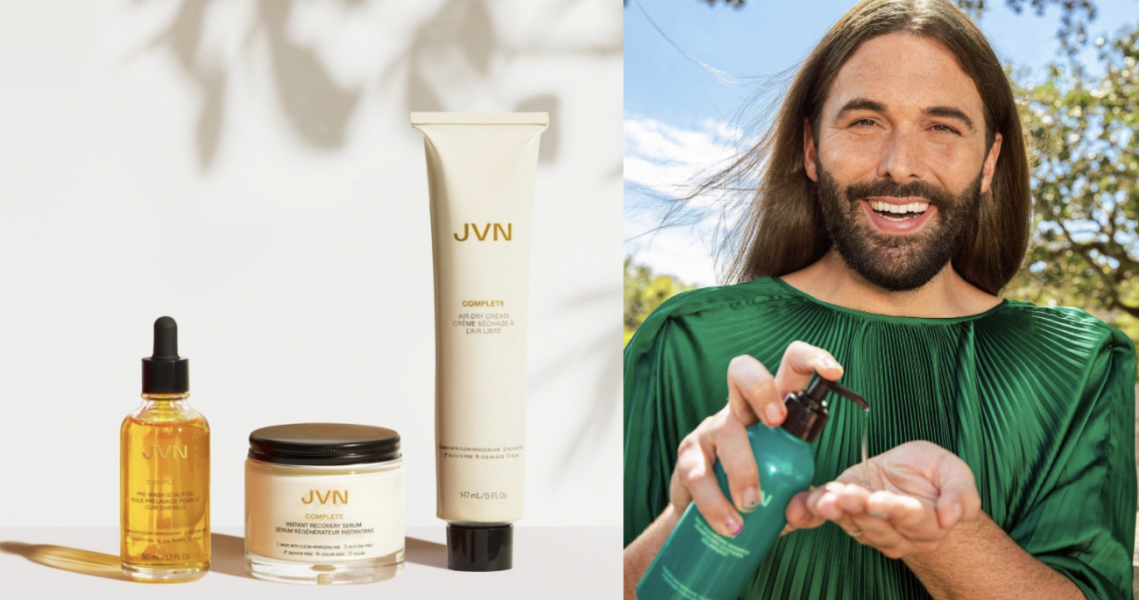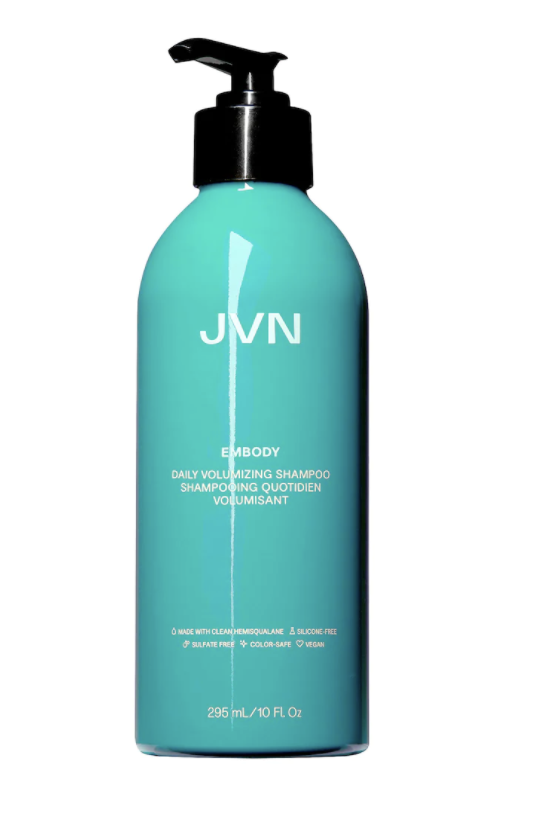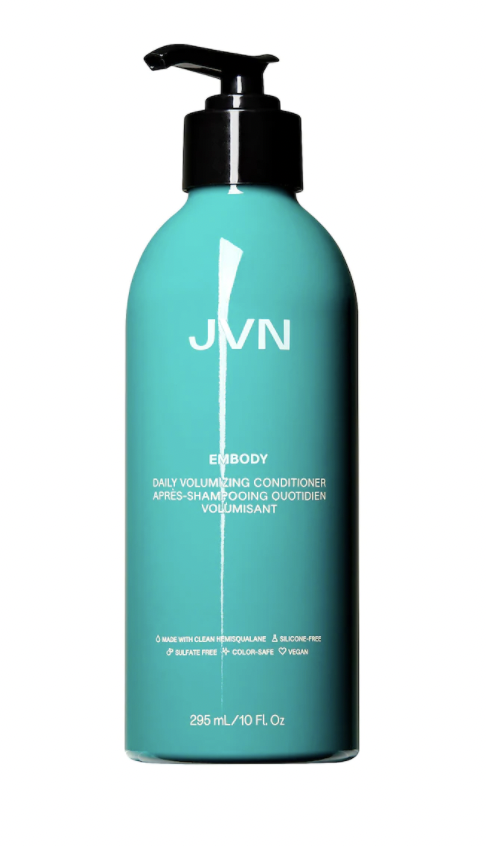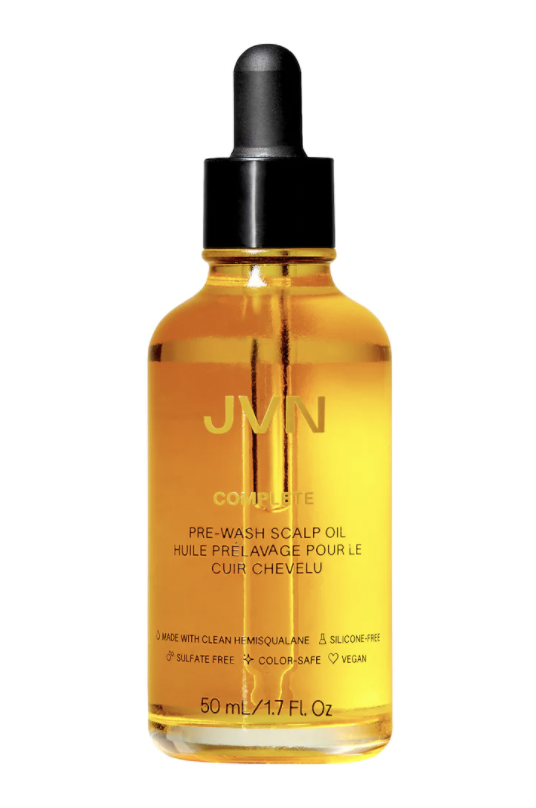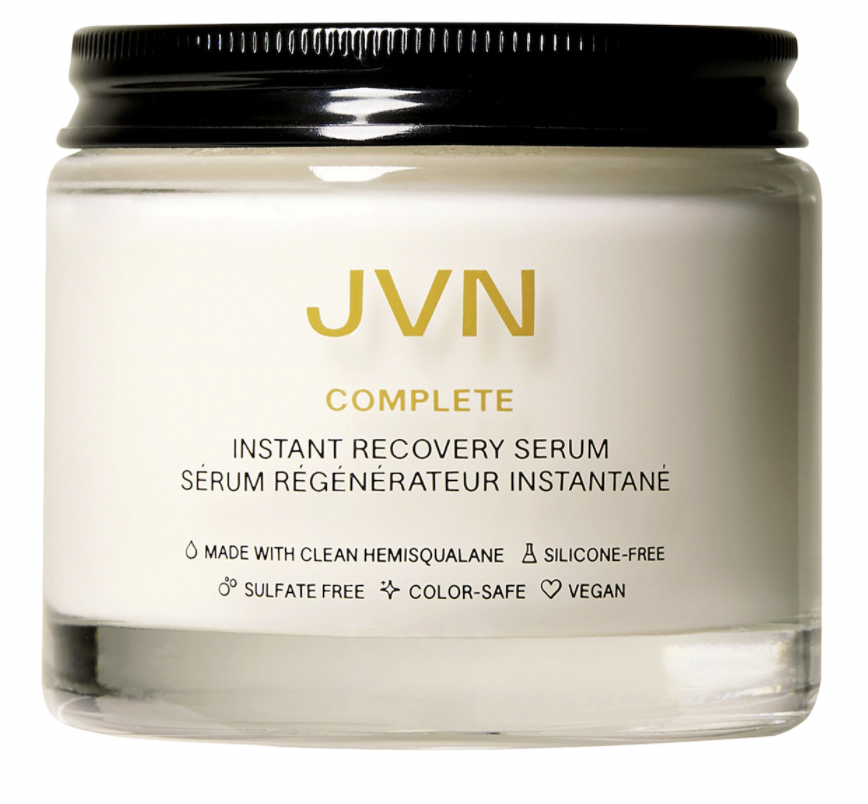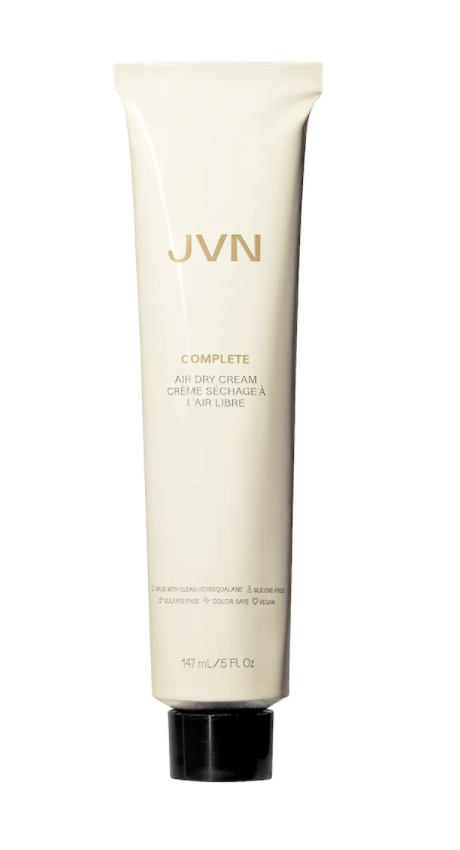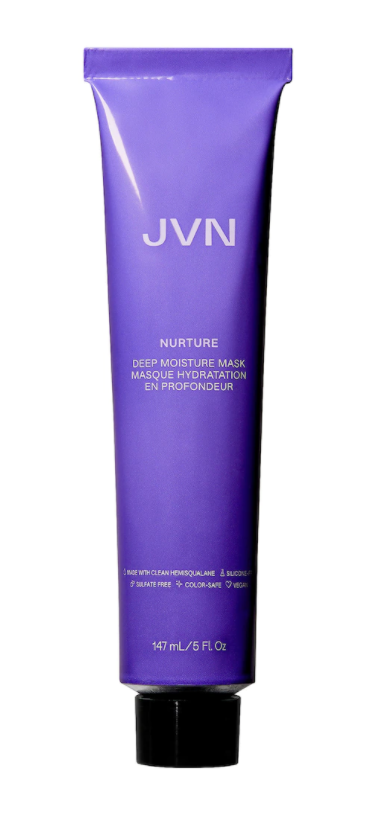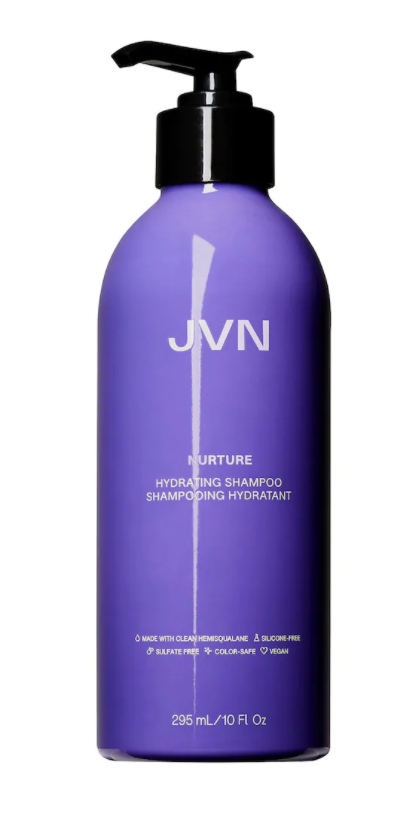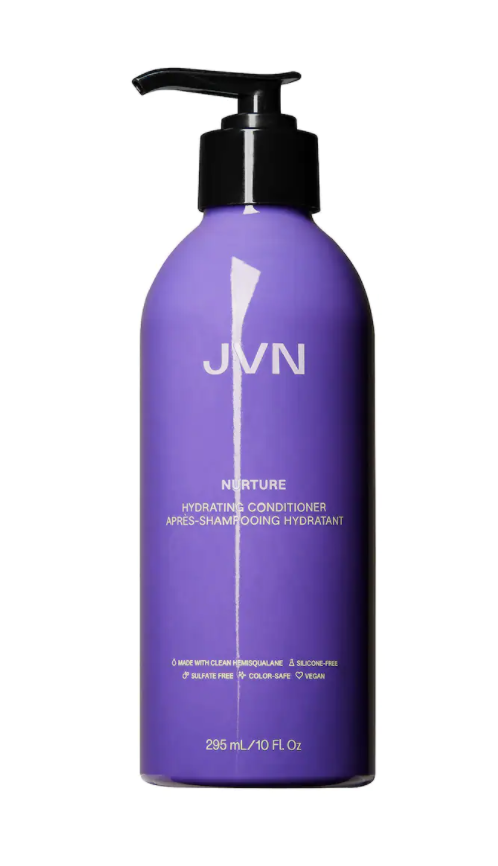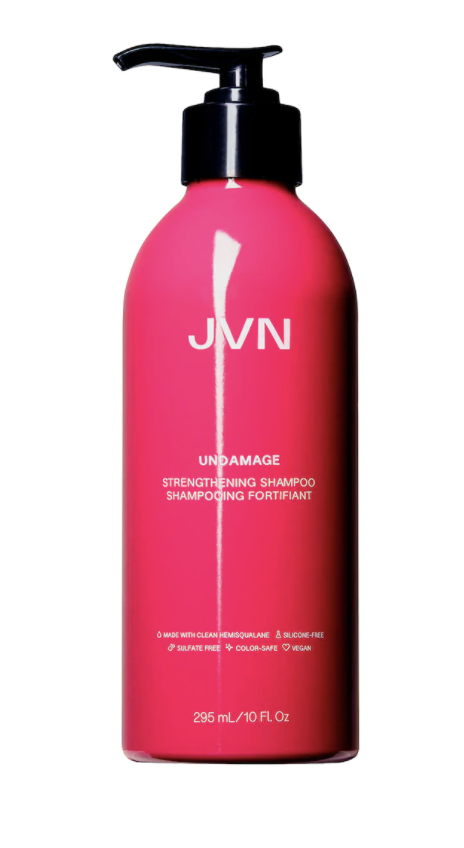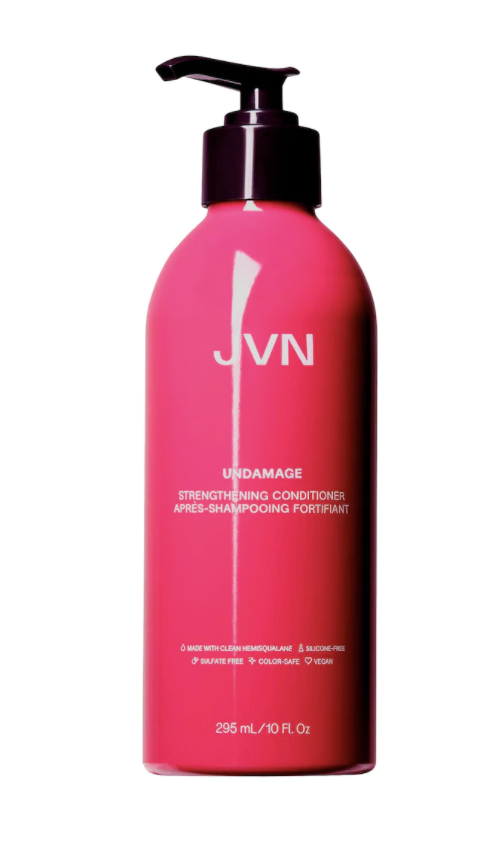All products featured on Glossy Pop are independently selected by our editorial team. However, when you buy something through our retail links, we may earn an affiliate commission.
Jonathan Van Ness was looking up at larger-than-life-sized campaign imagery for a new product his brand, JVN, is launching tomorrow, at a press event at Chelsea Piers. “Can I take those home to remember this when I’m old?” Van Ness asked no one in particular.
Van Ness first launched JVN, in partnership with Amyris back in August. It kicked off with three shampoos, three conditioners, a hair mask, a hair serum, a pre-wash oil and air dry cream. On December 14, it will announce its first new launch since then. Amyris is also behind Biossance, Rose Inc and a number of other beauty brands. I met with JVN to talk about what makes his brand different, why different hair types don’t need different hair products why he has yet to meet Rose Inc founder Rosie Huntington Whiteley.

There are more celebrity beauty brands than ever right now. Why did you want to create JVN, and why was this the right time?
“My hair was feeling dry, and I wasn’t able to get rid of my breakage because I was just using products that… When it came to skin care, I knew that clean ingredients were really really beneficial. But when it came to hair care, I felt like I would use something that was clean if it worked as well. And then I was like, ‘Why can’t we have clean ingredients that work better?’
When I discovered where those ingredients were through meeting Biossance, that was what made it all click. So it was [about] finding the right partner, finding someone who believed in me, finding someone who was capable of making incredible formulas — which my product formulator, Ramya Viswanathan, did. She’s so fucking fierce, so fucking major — and she’s just brought all my visions to light in such an incredibly efficacious way. Our products work so brilliantly. They’re what I wish I always would have had.”
Was it hard to find a partner that supported you in creating a brand that was centered around acceptance and gender inclusivity? Do you think the beauty industry is making progress in this regard?
“We’re making progress, but we need to make more. That it was hard when I first started looking for the right partner, but once I found Amyris, nothing was hard. They believe in me. I wanted to make this line very de-gendered from the get-go — not for women, not for men. It’s for everybody. It’s for all hair types. And [Amyris has] been so supportive of that. My friend Alok [Menon] says we need to de-gender everything. So what I’m trying to do in the beauty industry, from within my own line, is let people know that they are already worth loving. They’re already worth celebrating. And everyone is welcome to play in the sandbox of self-care and hair care. Because all of us want to look better, all of us want to feel better. But I want people to know they already look amazing. It’s just: How can we just give your hair what it needs to be living its best life?”
Do you feel like it’s easier to de-gender the hair care category than other sectors of beauty?
“It’s not easy to de-gender anything, because [gender has] been so ingrained into our systems. But it’s incredibly difficult to de-gender anything in beauty because, so often, men are told specifically, primping or beauty or self-care is for women, period. I want to introduce this idea that, actually, hair care is for everyone. It’s not shameful to want your hair to look a different way, and it’s not shameful to want to play with your hair.
So it’s two very different issues. On the one hand, men are scared to get into the sandbox and play, and women a lot of times use these unrealistic beauty expectations to beat themselves up and not feel good enough about themselves. Because they feel like they can’t live up. And then, of course, there’s all of us nonbinary people who are just like fucking fierce and perfect. We’re just perfect. I’m just kidding.
There are years and years and decades and decades of societal pressures and beauty industry advertising that I’m trying to work against. I want to be more transparent about the fact that you don’t go into a shower, then come out with a perfect blow-dry. You have to style your hair. I want to be more realistic with everyone about what products actually do.”
Can you tell us about the process of creating the line?
“I’ve been involved in everything from the inception of the company to every single formulation to the products that were created. I wanted a moisture line, I wanted a line that helps damage, and I wanted a line for volume and body.
I think one thing that happens with a lot of celebrity beauty brands is that there are so many companies that just all have the same factory. But at Amyris, we make all of our own formulations in-house. We test our own formulas, manufacture our own formulas, package our own formulas. It’s a much smaller operation. Because of that, we’ve got a very nimble boat to steer. We don’t have this gigantic barge.
So we’re able to really customize and make our batches bespoke, in ways that other beauty companies aren’t because their formulations are… It’s a sea of same. Our formulations are very unique. And they’re very unique to JVN and, of course, Biossance and Costa Brazil and Rose Inc The four brands are all very unique and different from what other people have on the market.”
Have you connected with Rosie Huntington-Whiteley, now that you’re both partners of Amyris?
“We haven’t gotten to, but you know, if Jason Statham were my husband, I wouldn’t have time to come up for air, either. I would just be such a busy entrepreneur and then just, like, have my husband hold me until the pain goes away, every night of the week.”
Was it hard to create a collection that actually works for all hair types?
“It wasn’t really, but that’s another point of difference for us. I am obsessed with creating for hair concern, versus hair type. So all of our formulations are for a concern. I was educated at the Aveda Institute in Minneapolis, and I had tons of Somalian, Ethiopian and so many Black women, as well as white girls from Minnesota — we had such a huge, diverse group of people that we learned to do hair on. My textured hair teacher — this amazing Black woman named Heather — said to us, “Hair is hair is hair is hair is hair,” no matter what the texture is.
There might be a few extra steps that you have to take for textured hair, either in applying heat or dressing the hair with products prior to applying heat to get a desired result. But hair is hair, and you can’t be scared of it.
There’s usually three things that we need: more moisture, more strength, or more volume and body. That’s why I did Nurture and Damage and Embody. And then when it came to styling, what we really needed was heat protection. So that’s why I made Instant Recovery Serum. And then Air Dry Cream is really a very universal product. It’s for everyone, but also people that just want to be able to quickly get out the door.”
Are there any brand initiatives that we should know about for JVN in 2022?
“One thing that I am obsessed with about JVN is that, quarterly, we have different partners. There are so many different folks who need stuff. I wanted to be able to pivot, as needed. So for Giving Tuesday, we partnered with the You Are Essential organization [a national crisis relief organization], which was started by my friend Ashlee Marie Preston. It’s an ingrained part of our brand, but I want to change it every three months, because I don’t want to check out.”

